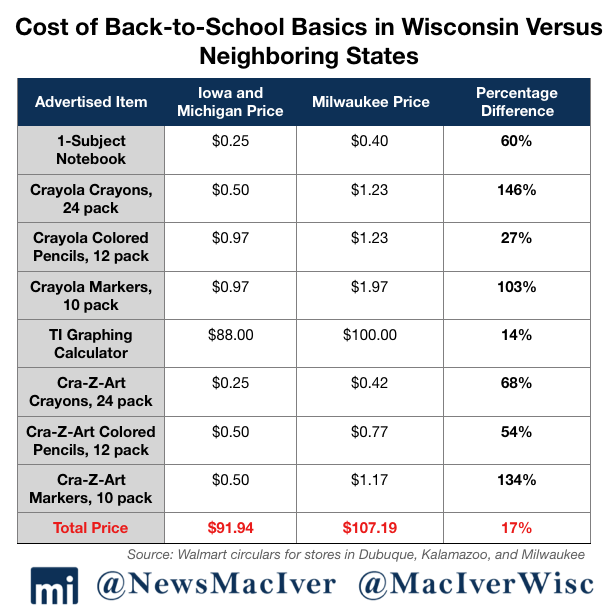
MacIver News Service | August 31, 2018
By Chris Rochester
MADISON, Wis. — Wisconsinites hunting for back-to-school deals are out of luck for yet another year thanks to the state’s minimum markup law, which outlaws sale prices that are too low.
The minimum markup law, formally known as the Unfair Sales Act, bans retailers from selling merchandise below cost. The law was originally passed back in 1939 and also requires a 9 percent price markup on specific items like alcohol, tobacco and gasoline.
While this year shoppers in Wisconsin enjoyed a sales tax holiday on many back-to-school items earlier in August, bargain hunters would save money year-round on virtually all products if not for the minimum markup law.
Unfortunately for back-to-school shoppers, Wisconsinites are forced to pay for this archaic law that’s still on the books despite multiple attempts to repeal it.
According to advertisements obtained by the MacIver Institute from the end of August, Walmart stores in Milwaukee charged higher prices for a number of common back-to-school items compared with other Walmart stores in Iowa and Michigan.
Like in past years, families in Milwaukee buying basic items like notebooks, markers, and crayons can expect to pay anywhere from 14 to 146 percent more than Walmart shoppers in Dubuque, Iowa, and Kalamazoo, Mich.
A 24-pack of Crayola Crayons posted the largest price difference, costing 146 percent more in Milwaukee than in cities in the neighboring states. The same was true for similar basic school supplies.
Parents picking up a one-subject notebook at Walmart in Dubuque, for example, only paid 25 cents. That same notebook cost 40 cents in Milwaukee – a 60 percent gap. Crayola markers cost 97 cents in Kalamazoo, but thanks to the archaic minimum markup law, those same markers cost $1.97 in Milwaukee, a whopping 103 percent difference.
A Texas Instruments graphing calculator cost $100 in Milwaukee, but just $88 in both Iowa and Michigan.
The added costs stack up. A basic shopping list would cost 17 percent more for a Milwaukee back-to-school shopper than in nearby states – 85 percent more not including the calculator.
Efforts to repeal the antiquated minimum markup law stretch back several years. Most recently, a partial repeal bill led by Sen. Vukmir and Rep. Jim Ott, and joined by Sen. Dave Craig and Rep. Dave Murphy, was the first repeal attempt to receive a hearing in the legislature.
“What are you hoping to accomplish by keeping this outdated law on the books?” Todd Peterson, regional general manager for Walmart Stores in Wisconsin, asked the Senate Committee on Agriculture, Small Business and Tourism. Much has changed since the law was enacted in 1939, he and his colleagues argued.
But as with previous attempts at repealing the anti-consumer law, that bill went no further.
Even though minimum markup repeal has hit a wall in the Legislature, a 2015 poll found that Wisconsinites are tired of paying higher prices and want the law finally taken off the books. The poll found 80 percent of respondents had an unfavorable view of the minimum markup law when told “Wisconsin residents are required to pay more for many on-sale items than residents in neighboring states simply because of this 75-year-old law.”
Respondents were just as angry when told that “the law forbids retailers from selling to consumers below cost and also requires that gasoline retailers sell gas to consumers with a minimum 9 percent markup.”
The minimum markup law also outlaws many of the discounts posted on popular national bargain hunting days like Black Friday or Amazon Prime Day, which in Wisconsin could better be called “Amazon Crime Day.”
While this year shoppers in Wisconsin enjoyed a sales tax holiday on many back-to-school items earlier in August, bargain hunters would save money year-round on virtually all products if not for the minimum markup law.
With repeal efforts once again stalled at the doors of the Legislature, bargain hunters should beware: Wisconsin’s Price Police remain on the prowl during yet another back-to-school shopping season.
